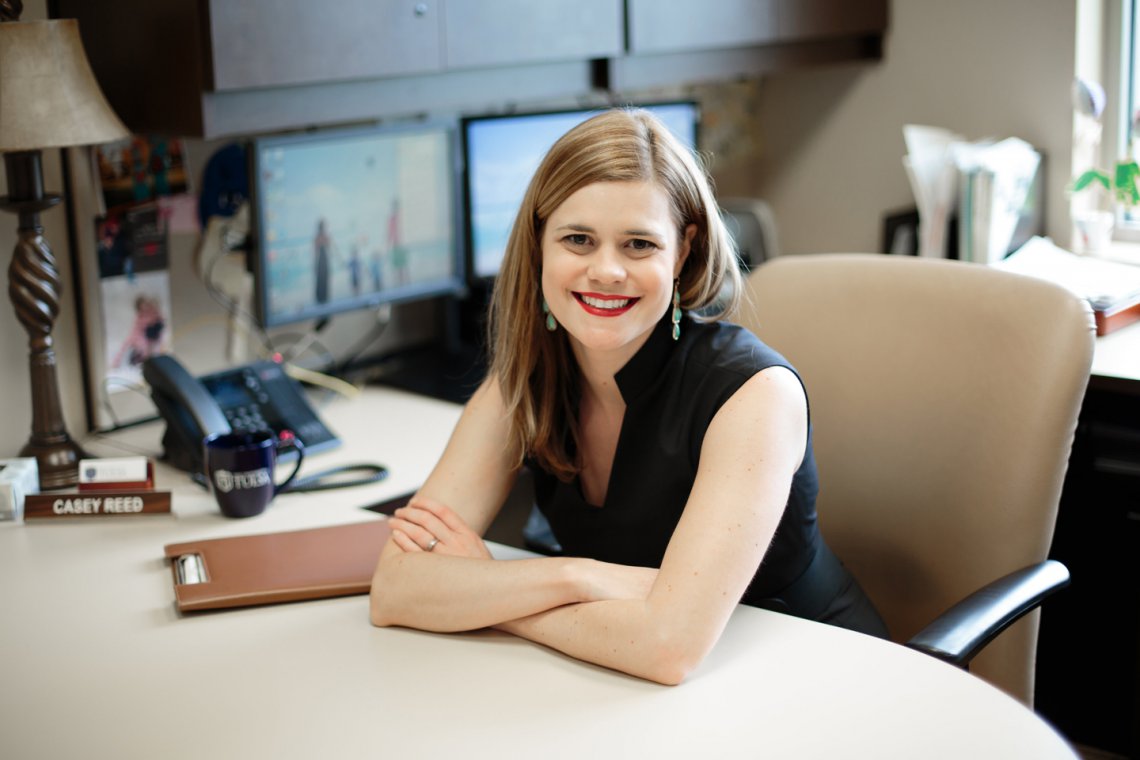Higher education recruitment is about much more than sending out the coveted acceptance letter. As the Associate Dean of Admission for The University of Tulsa, Casey Reed relies on her communication, marketing and financial skills to connect and engage with each incoming class.
A psychology major, Casey originally wanted to pursue counseling. However, after working at an inpatient drug abuse treatment facility, she was fascinated by the management roles within the organization and switched tracks.
Casey’s own career path has been a testament to her hard work. She earned her MBA while pregnant (twice!) and working full time. This spring, Casey received her 5th promotion at University of Tulsa and starts as the Dean of Admission in July. Today Casey shares her journey from a psychology major to her new role as Dean, relying on her own secret formula of a positive attitude and a little luck.
Her Starting Point
How did your B.A. degree in psychology from the University of Oklahoma and your MBA from Oklahoma State University prepare you for your job today? How did your education influence your career path overall?
My psychology degree taught me to see differences in personalities and to consider other perspectives than my own. It taught me to consider motives and explore decision making processes. It also taught me to appreciate data and to value informed decisions over hunches. My MBA provided me with a strong business foundation that I use on a daily basis. Financial acumen and marketing, especially, have become vital as my responsibilities have increased.
Your first job out of college was actually as a psychology tech. What did you take away from this experience and apply to your job in admission?
That job was probably the best thing I could have done after college. I worked in an inpatient drug abuse treatment facility for women and their children. I was the only one on staff who took the patients as a group off campus on different outings. I drove them in a shuttle bus. I was out of my comfort zone because the women I supervised were all older than me. I learned to be assertive and decisive and to act confident even when I wasn’t. At the time, I planned to go to graduate school to become a counselor, but I surprised myself by becoming more interested in the management of the organization than in a counseling role.
Did you always want to work in a field like college admission? When did you first develop an interest in it?
When I was in high school, I worked after school in the Student Affairs Office of the local community college. It was such a dynamic atmosphere, and every day on campus was different. When I was researching MBA programs, I came across a job opening at OSU-Tulsa in the Prospective Student Services office. I thought back to my high school job and decided to give it a try. Later on, I moved to The University of Tulsa, because my husband was in law school here and I had grown up a Golden Hurricane fan. I didn’t necessarily plan on staying in higher education, but it is a high-energy, rewarding field and now I can’t imagine working anywhere else.
How has the college admission process changed over the years since you first started out and how have you adapted to better help prospective students? Has any element of your career surprised you? What do you think the future of college admissions will look like?
So much has changed since I started. After the recession in 2008, families started questioning the value of a college education, so there is more pressure on me to articulate the value and explain the outcomes. Also, marketing platforms have expanded rapidly, so my office has to be prepared to interact with students across multiple social media platforms, as well as through the more traditional methods of direct mail and high school visits. The way college entrance tests are offered and evaluated is changing and accrediting groups and processes are facing new pressures. I am able to track student interest in new ways and now have more data to analyze, which means there is a higher level of scrutiny across all areas.

Her Big Break
How did you land your current role as Associate Dean of Admission at the University of Tulsa? What does a typical year/job responsibilities look like? What advice would you offer to others interested in pursuing a similar career?
I worked my way up in the Admission Office from an entry-level admission counselor position. As Associate Dean, I supervise most of the admission counseling staff and assist with strategic direction and recruitment initiatives. When I take over as Dean in July, it will be my fifth promotion at TU. I have been fortunate to work under great leaders who have mentored me and encouraged my professional development from the beginning. In terms of advice, I would encourage entry level staff to speak up with ideas, make observations and ask questions. Make yourself invaluable by developing a unique skill set or mastering a specific task. Also, remain positive. It is hard to be promoted into a leadership role if you are not seen as a motivational force on the team.
Working in admission must give you a glimpse into how any recruiter’s mind works. What sort of qualities would someone recruiting a dean of admission be looking for in an applicant that makes them stand out? Do you think this carries over from college admissions to the real world and job applications as well?
Chief enrollment officers need to be strong communicators, marketers and leaders. You need to be able to communicate effectively with campus constituents, high school guidance counselors, alumni and prospective families. Marketing is key, especially via social media. You have to be interested in data analytics and be able to use that data to plan and justify your recruitment strategy. You need experience in personnel management, especially millennial employees since most admission counselors are recent college graduates. Finally, you need experience managing budgets, both for your office and for scholarship purposes. These skills definitely carry over into other fields outside of admission.
Looking back on your career, what steps did you take that allowed you to climb the ladder and work your way up in the university? Would you do anything differently in retrospect?
Completing my MBA was pivotal because I proved to myself how badly I wanted to expand my knowledge and skill set. Working full-time while in graduate school was difficult, especially because I traveled frequently for TU and was pregnant (twice) during the course of my program. It took me several years to complete my degree, but I regularly use the skills I mastered. Something else that set me in line for promotion is my ability to problem solve. I don’t hesitate to address challenges, but I make sure I have a suggested solution before pointing out a problem. I have always fought to make the office environment a better place, even when I didn’t have the authority to implement change directly. Now that I do, increasing staff morale and improving performance and efficiency are still my top priorities.
Congratulations on your new position as the next Dean of Admission! How will your duties change from what you’re doing now? What are your goals for the next position?
Thank you! I am very excited for my new role. Many of my responsibilities will carry over so I will need to delegate more of my everyday tasks so I can devote more energy to larger strategic objectives. I hope to further develop partnerships with campus faculty and other departments so we can work together to bring in next year’s class and serve the students when they are here.
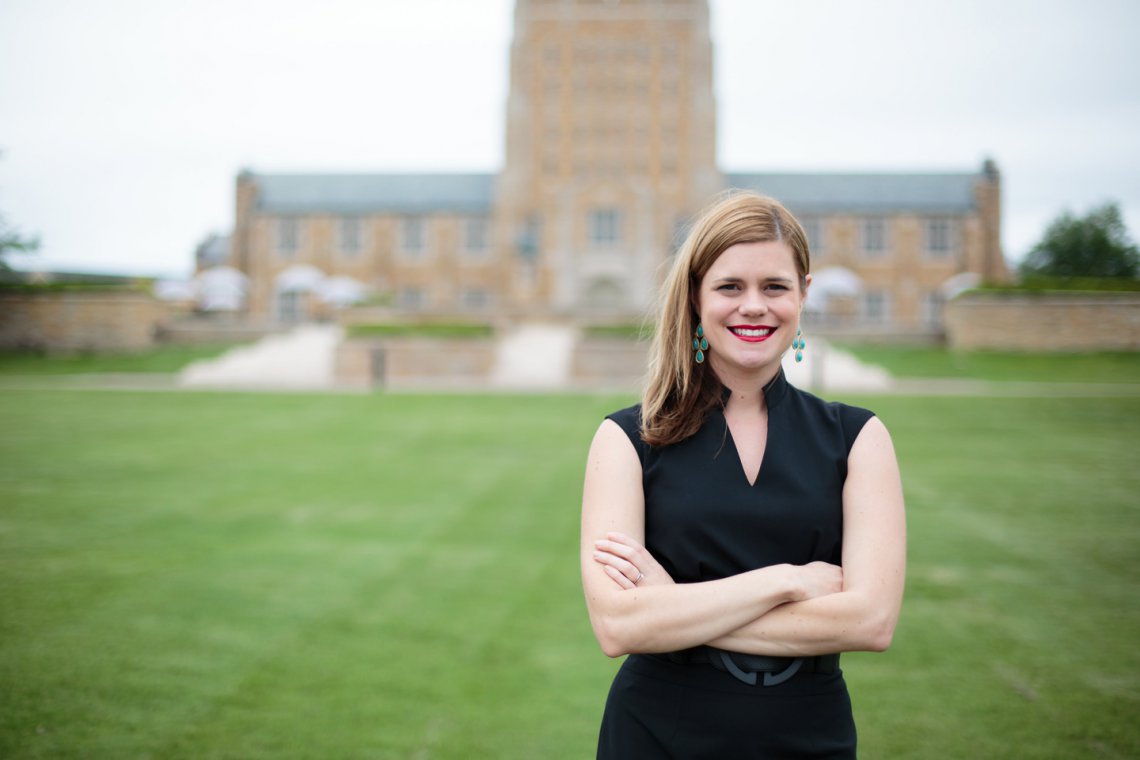
Her Perspective
As both the Associate Dean of Admission and as the mother of three kids, you must juggle quite a few competing responsibilities. How do you cope with it all, and how do you manage your time wisely?
I am very comfortable delegating; I don’t feel the need to do every small thing myself or a certain way. At work, I am comfortable delegating tasks to my staff. I try to delegate tasks to employees who have shown particular interests in an area or who need to work on a skill in that area, so it benefits both sides. At home, I lean heavily on my husband and extended family. I ask for help when I need it and speak up when I am overwhelmed. I try to be realistic in my planning for the week so I don’t underestimate how much time a project or chore will take. I take vacation days to go on field trips with my son’s kindergarten class and read applications in the evenings after my children go to bed. Some days are harder than others, but both my children and my job bring me so much joy that I can’t imagine not having both. My magic formula consists mostly of a positive attitude and a little luck.
In addition to having three kids, you are also a supporter of the charity Childhood Apraxia of Speech Association of North America. How has your love and empathy for children impacted your working relationships with students? What hopes do you have for the students you work with?
Both of my sons have Childhood Apraxia of Speech, so CASANA is near and dear to my heart. When my oldest son was diagnosed with it, I was told he may never speak normally. I poured my heart into researching apraxia and became a lifelong advocate of CASANA and of early intervention. My children put in hundreds of hours of speech therapy practice before they were school age. If you met my boys today, you wouldn’t guess they had apraxia, but their struggles with speech shaped their personalities and impacted their confidence. Witnessing their progress fully convinced me that anything is possible. In college admission, you meet students every day who inspire you with their stories and astonish you with their strength. I hope to make an impact by increasing college access for underrepresented populations and first generation students.
You currently work closely with students from Tulsa’s Bishop Kelley High School as well as transfer students. What advice do you give these students, or to anyone looking to further their education?
College is a life-changing experience, so you need to look for the university that will help transform you into the adult you are supposed to be. Start thinking early on about what type of student you are, how you learn, and the type of peer group you want to surround yourself with. Don’t use your high school years to pad your resume for college; use them to explore your interests and to hone your leadership abilities. Admission committees want to get to know the real you, so you need to know that person first.
And finally, what do you wake up looking forward to? What's next for your career?
I look forward to seeing my babies every time I wake up. My children are so sweet in the mornings! But after I have cuddled them and gotten them ready for the day, I look forward to going to work and challenging myself. It is difficult to fully prepare for your day in admission; every day is different and there are always new questions and challenges. Each day, I take another step towards accomplishing the university’s strategic enrollment directives by recruiting students who are looking to change the world and are eager to get started. When I read about TU alumni who are making a difference in their industries and communities, I feel proud because they are positively impacting the world that my children are growing up in. What could be better?
You May Also Like
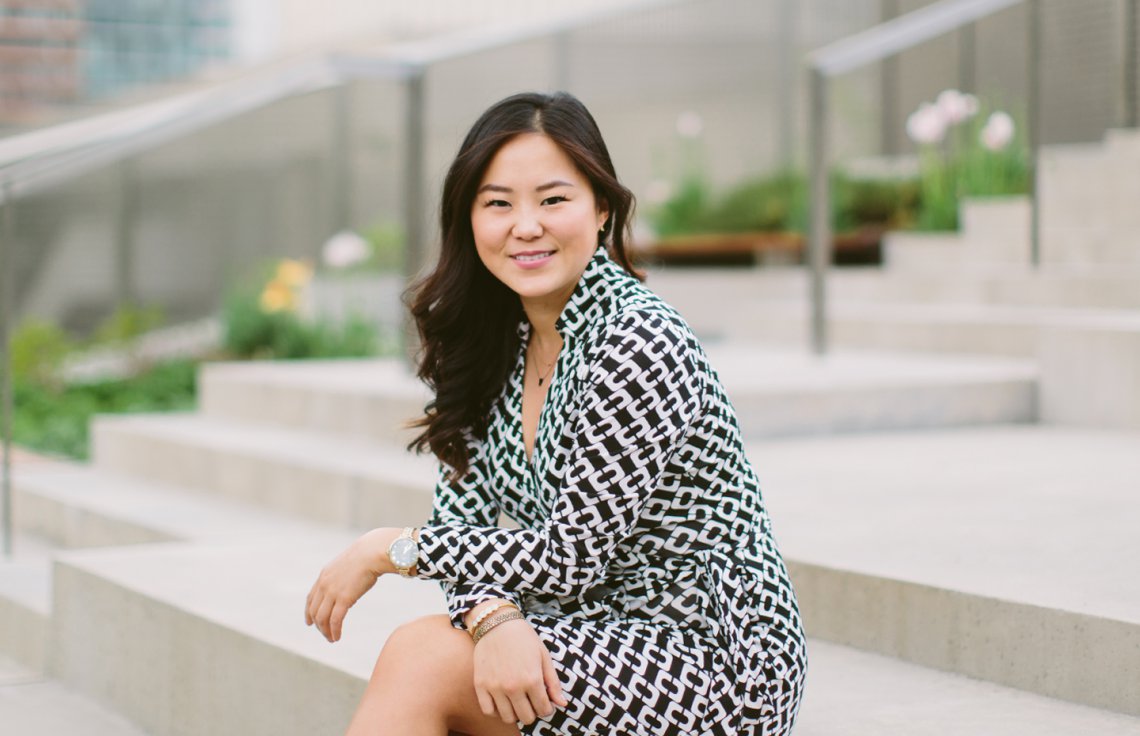
Government + Public Policy
How to Become a Foreign Service Officer
Ever wondered what it would be like to work in Foreign Affairs? Gloria Chou knows, and she's spilling.

Government + Public Policy
Noor Elkhaldi on Taking a Break From School to Work as an SVU Counselor
"You cannot care for others if you do not care for yourself."
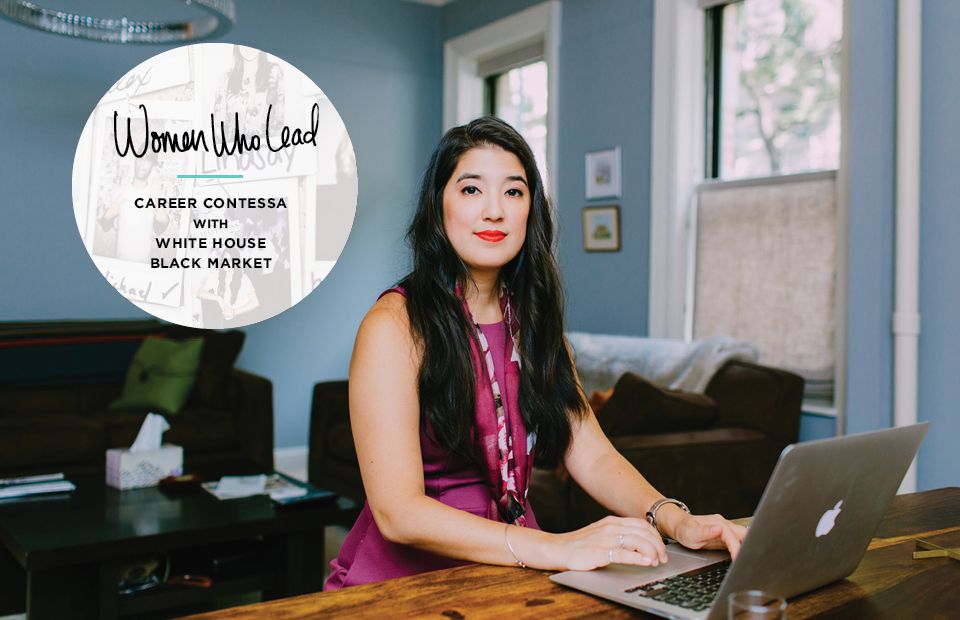
Consumer Services, Education, Finance
Women Who Lead: Alexandra Dickinson, Founder and CEO of Ask For It
On taking risks and asking for more—always.
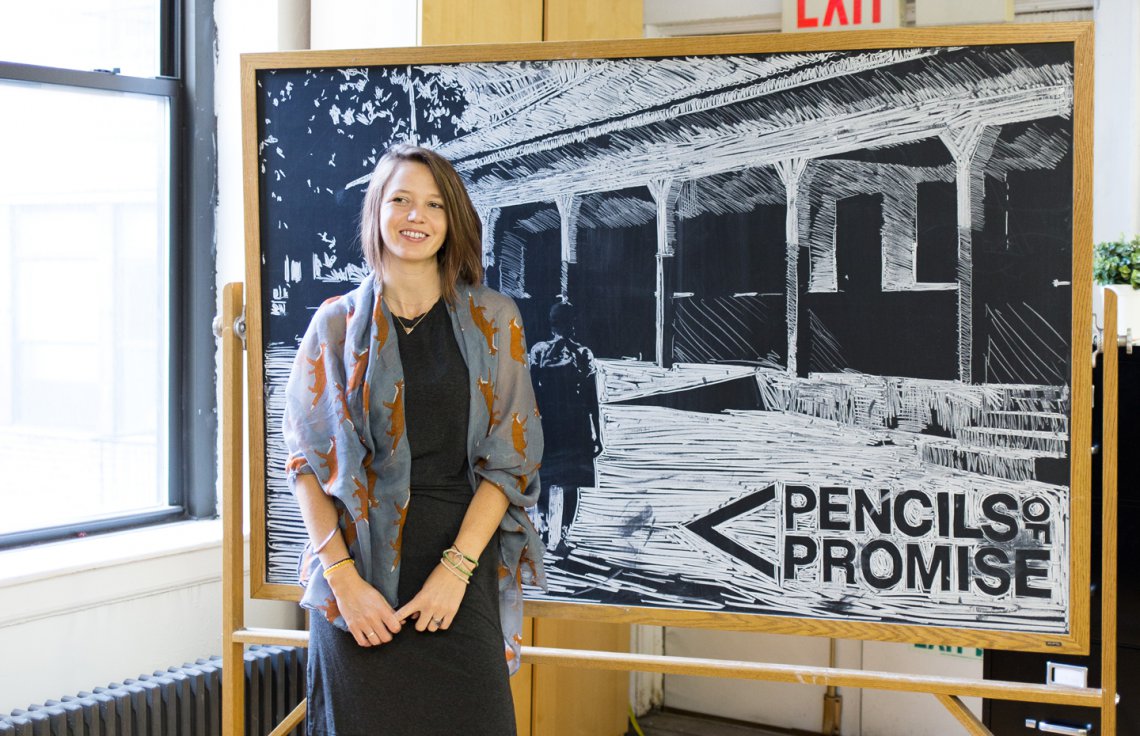
Nonprofit, Social Responsibility
Leslie Engle Young on What a Director of Impact Actually Does
This philanthropic globetrotter found her dream career working at Pencils of Promise.

Entertainment, Government + Public Policy
Meet the Woman Behind Your Favorite T.V.
See how Candace's legal background has helped her climb the ladder to a director role at Sony Pictures.

Government + Public Policy
This Millennial Entrepreneur Talks Politics, Activism, and...How to Vote?
Election season's almost over, but Maria Yuan's company, IssueVoter, is just getting started.
Get the Best Career Advice Delivered To Your Inbox
Join our newsletter to stay in the loop.
